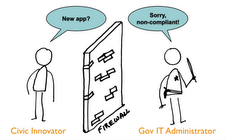The following guest post is by Travis Korte from the Information Technology & Innovation Foundation.
The Knight Foundation received hundreds of submissions to its “Knight News Challenge on Open Gov.,” a competition designed to create new tools to improve how citizens interact with government. The applicants noted a number of problems with government data: confusing interfaces for government data portals, poor public understanding of proposed policies, inaccessible court records, strict security regulations impeding civic hacking projects, poor visualization of government data and a lack of information about municipal projects.
Last month, the Foundation awarded over $3.2 million to eight winners. Here’s a round-up of what they do:
- Procure.io: The Oakland and Atlanta-based organization will produce a streamlined procurement system for government contracts. Using a simple interface, government officials will be able to submit requests for proposal to a publicly accessible and easily indexed database. By simplifying the contracting process, Procure.io stands to broaden the pool of applicants and encourage lower bids.
- Outline.com: This Cambridge, MA-based “policy simulation” startup will let users input their age, income and other general details on a website and then use sophisticated economic models to output a positive or negative dollar amount that represents their expected net income change as a result of a proposed policy. Outline will also provide a transparent version-control system to catalog changes in various policies.
- Oyez: Founded in 1997 at IIT Chicago-Kent College of Law, Oyez has overseen successful digitization initiatives for U.S. Supreme Court documents, and now hopes to apply the same model to state supreme courts. The effort will collect, catalog, standardize, annotate and release to the public the records of the courts of the five largest states (CA, FL, IL, NY, and TX). The organization will also work to annotate the records with metadata and plain-English summaries, in partnership with local “public-spirited institutions.”
- GitMachines: The Washington, DC-based team will provide free, cloud-based virtual machines that are compliant with NIST and GSA software standards and come pre-configured with commonly used open government tools such as the Apache Tomcat web server and data workflow management tool Drake. By offering these servers from a central, virtual depot, GitMachines will also reduce costs associated with ad hoc server-side IT staffing.
- Civic Insight: Building off their work on BlightStatus, an urban blight data visualization tool for New Orleans, the San Francisco-based Civic Insight will expand the scope of their dynamic mapping solution, working with other cities on applications related to economic development and public health.
- Plan in a Box: A Philadelphia- and New York-based team will build a web publishing platform designed for municipal planning activities. Aimed at geographically-constrained projects in small and medium-sized cities, Plan in a Box will offer a centralized news and feedback repository, with mobile and social integration. Organizers hope to enable effective communications without any costly web design or excessive configuration on the part of city officials.
- Smart Communities – Pushing Government Open: The Chicago branch of the Local Initiatives Support Corporation offers a three-pronged approach to grow the community’s capacity to participate in and take advantage of future open data initiatives: 1) attract more internet users by providing classes and job training 2) promote currently available open data by introducing existing data projects on neighborhood web portals and in special meetups and 3) meet with community members in five Chicago neighborhoods to prioritize and request additional open data.
- OpenCounter: The City of Santa Cruz, CA and Code for America will simplify the process of opening a small business by developing an application programming interface (a set of protocols for building software using the OpenCounter platform), a mechanism for non-technical users to customize the website, and tools for site selection and project comparison. These tools will be added to the existing OpenCounter website, which provides a portal to the city’s business permitting process.
The winning entries provide a revealing glimpse into an emerging concern in open government data projects: what sorts of web infrastructure will be necessary to allow more people to actually make use of the data? Oyez represented the only traditional digitization project among the winners; others, such as Civic Insight and OpenCounter, trained their focus on the post-digitization landscape, proposing projects to redesign the data offerings that already exist.
The most ambitious projects took a further step back from data itself, and proposed to address gaps in knowledge, skills and resources related to open government that no amount of interface design is likely to fix. From GitMachines, which will attempt to help surmount security obstacles to government software adoption, to Smart Communities, which will promote data literacy as a gateway to participation in open government, a common question emerged. Data is here; now what will we have to change about ourselves and our institutions to make good use of it?
Travis Korte is a research analyst at the Information Technology & Innovation Foundation (ITIF), where he works on the Data Innovation project. He has a background in journalism, computer science and statistics. Prior to joining ITIF, he launched the Science vertical of The Huffington Post and served as its Associate Editor, covering a wide range of science and technology topics.
If you’re interested in Open Government Data, you should be on our Open Government Data group!
This post is by a guest poster. If you would like to write something for the Open Knowledge Foundation blog, please see the submissions page.










1 thought on “What Does $3.2M Buy in Open Government?”
Comments are closed.